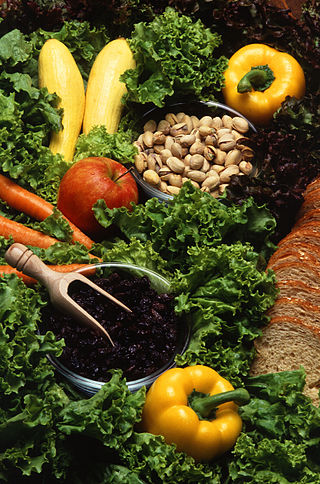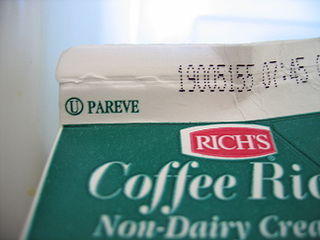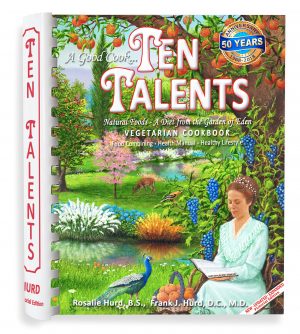
Vegetarian cuisine is based on food that meets vegetarian standards by not including meat and animal tissue products. Lacto-ovo vegetarianism includes eggs and dairy products. Lacto vegetarianism includes dairy products but not eggs, and ovo vegetarianism encompasses eggs but not dairy products. The strictest form of vegetarianism is veganism, which excludes all animal products, including dairy, honey, and some refined sugars if filtered and whitened with bone char. There are also partial vegetarians, such as pescetarians who eat fish but avoid other types of meat.

Textured or texturized vegetable protein (TVP), also known as textured soy protein (TSP), soy meat, or soya chunks is a defatted soy flour product, a by-product of extracting soybean oil. It is often used as a meat analogue or meat extender. It is quick to cook, with a protein content comparable to certain meats.

The Reuben sandwich is a North American grilled sandwich composed of corned beef, Swiss cheese, sauerkraut, and Thousand Island dressing or Russian dressing, grilled between slices of rye bread. It is associated with kosher-style delicatessens, but is not kosher because it combines meat and cheese.

A meat alternative or meat substitute is a food product made from vegetarian or vegan ingredients, eaten as a replacement for meat. Meat alternatives typically approximate qualities of specific types of meat, such as mouthfeel, flavor, appearance, or chemical characteristics. Plant- and fungus-based substitutes are frequently made with soy, but may also be made from wheat gluten as in seitan, pea protein as in the Beyond Burger, or mycoprotein as in Quorn.

In kashrut, the dietary laws of Judaism, pareve is a classification of edible substances that contain neither dairy nor meat ingredients. Food in this category includes all items that grow from the ground, fish, eggs, and non-biological edible items.

Tofurkey is a plant-based meat substitute patterned after turkey, in the form of a loaf of vegetarian protein, usually made from tofu or seitan with a stuffing made from grains or bread, flavored with a broth and seasoned with herbs and spices. It is often served at a vegetarian or vegan Thanksgiving meal.

Morningstar Farms is a division of the Kellogg Company that produces vegan and vegetarian food. Many of their offerings are plant-based variations of traditionally meat products. Their products include meatless chicken nuggets, popcorn chicken, corn dogs, breakfast sausage, burgers, hot dogs, bacon, and pizza snack rolls with vegan cheese. Originally, Morningstar offered some, but not all vegan products. In 2019, Morningstar Farms announced all products would be vegan by 2021, but as of December 2022 this is still not true.

Okara, soy pulp, or tofu dregs is a pulp consisting of insoluble parts of the soybean that remain after pureed soybeans are filtered in the production of soy milk and tofu. It is generally white or yellowish in color. It is part of the traditional cuisines of Japan, Korea, and China. Since the 20th century, it has been used in the vegetarian cuisines of Western nations.

Lightlife Foods is a company that produces food for plant-based diets. In 2018, its worth was estimated at $80 million. It is best known for its plant-based veggie dog, Smart Dog, which launched in 1993. In 2019, the company launched a plant-based burger to compete with Impossible Foods and Beyond Meat. Lightlife Foods is a carbon-neutral company.

Tofurky is the brand name of an American vegan turkey replacement made from a blend of wheat protein and organic tofu.

Pescetarianism is the practice of incorporating seafood into an otherwise vegetarian diet. Pescetarians may or may not consume other animal products such as eggs and dairy products. Approximately 3% of adults worldwide are pescetarian, according to 2017–2018 research conducted by data and analytics companies.
La Loma Foods, formerly named Loma Linda Food Company and Loma Linda Foods, and with products presently branded under the name Loma Linda and Loma, is a former food manufacturing company that produced vegetarian and vegan foods. It is presently an active brand of vegetarian and vegan food products produced and purveyed by the Atlantic Natural Foods Company of Nashville, North Carolina. Loma Linda Foods began operations in 1905 under the name The Sanitarium Food Company and was owned by the Seventh-day Adventist Church until 1990.

Ten Talents is a vegetarian and vegan cookbook originally published in 1968 by Rosalie Hurd and Frank J. Hurd. At the time, it was one of the few resources for vegetarian and vegan cooks. The cookbook promotes Christian vegetarianism and a Bible-based diet, in keeping with teachings of the Seventh-day Adventist Church. By 1991, the 750-recipe cookbook was entering its 44th printing and had sold more than 250,000 copies. An expanded edition with more than 1,000 recipes was issued in 2012.

The Farm Vegetarian Cookbook is a vegan cookbook by Louise Hagler, first published in 1975. It was influential in introducing Americans to tofu, included recipes for making and using tempeh and other soy foods, and became a staple in vegetarian kitchens.
William Roy Shurtleff also known as Bill Shurtleff is an American researcher and writer about soy foods. Shurtleff and his former wife Akiko Aoyagi have written and published consumer-oriented cookbooks, handbooks for small- and large-scale commercial production, histories, and bibliographies of various soy foods. These books introduced soy foods such as tofu, tempeh, and miso on a wide scale to non-Asian Westerners, and are largely responsible for the establishment of non-Asian soy food manufacturers in the West beginning in the late 1970s. In 1980, Lorna Sass wrote in The New York Times, "The two people most responsible for catapulting tofu from the wok into the frying pan are William Shurtleff and Akiko Aoyagi.” In 1995, Suzanne Hamlin wrote in The New York Times, “At the turn of the century there were two tofu suppliers in the United States. Today there are more than 200 tofu manufacturers...and tofu can be found in nearly every supermarket."













